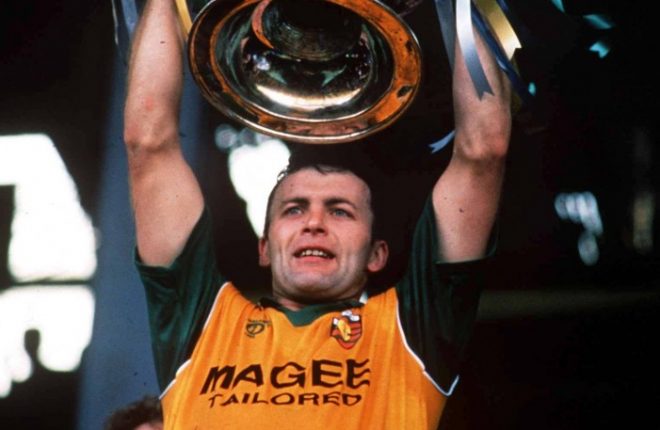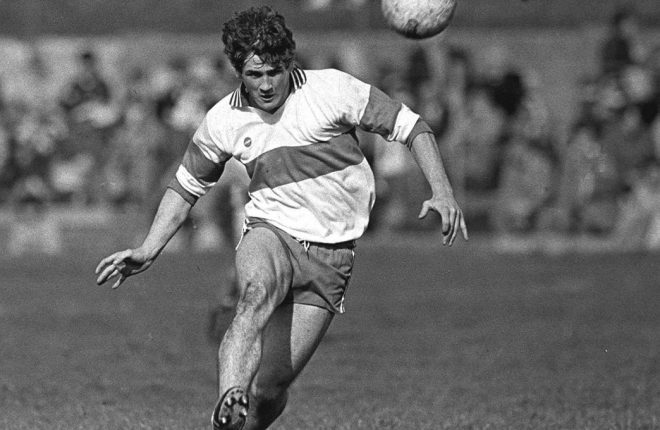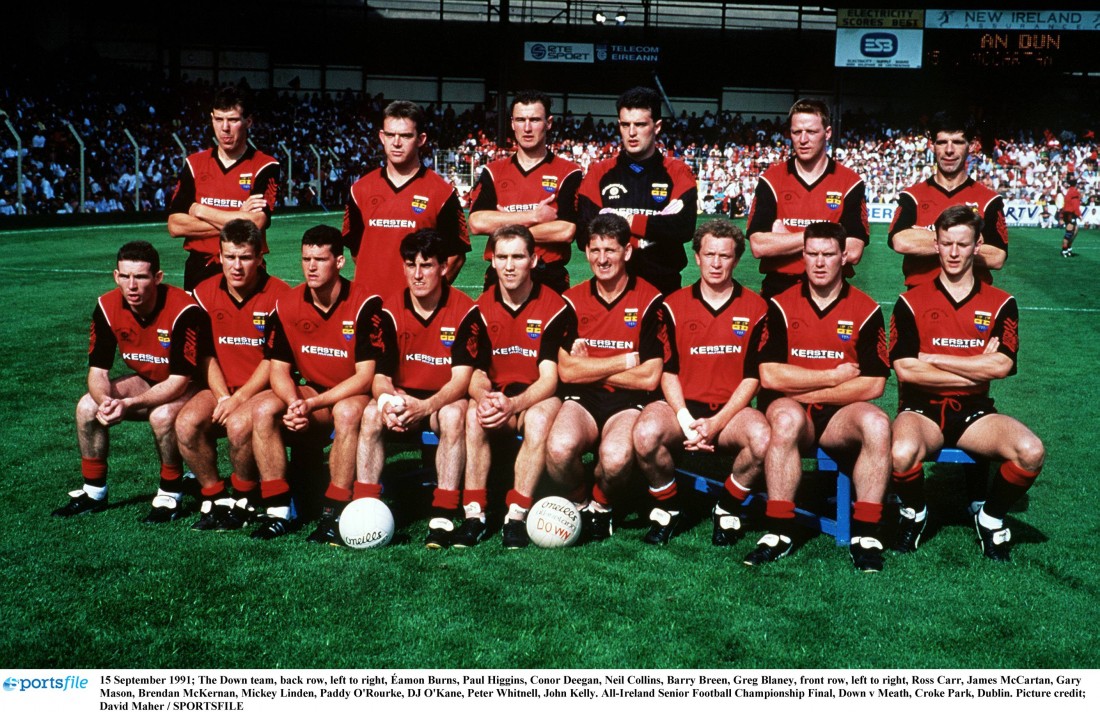By Frank Craig
DOWN upset more than 20 years of Munster-Leinster supremacy when, almost without notice, they blew the All-Ireland gates off their hinges with their Sam Maguire win in 1991.
It was that paving of the way which allowed the likes of Donegal, Derry and the Mourne men themselves, once again in 1994, to follow.
There is no doubt that in some quarters, Ulster football’s emergence as an All-Ireland force at the beginning of the ’90s would have ruffled feathers.
But by the time another Ulster representative, Tyrone, claimed their place yet again in an All-Ireland decider in 1995, there surely would have been real concerns that this was indeed a permanent changing of the guard.
Upsetting the likes of Kerry and Meath as well as denying Dublin their shot at re-emerging, a renaissance that the GAA would also have craved and indeed needed, along the way only served to add to the discontentment that had to now be out there for this ‘Nordie’ takeover.
At the outset of the last decade of the old millennium, a great Cork team had again landed the Sam Maguire – holding onto a title they’d also claimed the previous season, 1989.
Another footballing aristocrat of the time, Meath, edged out by the Rebels in 1990, were back in the decider again the following year.
At the time, warring rivals Cork and Kerry as well as Meath and Dublin, never wished each other anything but ill whenever they reached Croke Park.
But up here, at least back then, it was much different. County battle lines drawn so often in Ulster were dropped and the province was united behind the Mourne men’s cause in ’91.
Down, perhaps because of their historical pedigree and indeed the swagger that accompanied it, didn’t experience the same level of contempt that Ulster’s other upstarts, Donegal and Derry, might have in that era.
Ross Carr certainly didn’t feel it first time out. “I can only speak from my own experience, that never really came into it. From the late ’70s onwards, Down schools were winning All-Irelands.
“Yes, the glory days of senior All-Irelands were gone a while but we were moving in the right direction. The Belfast university teams were starting to come through and win Sigersons.
“They weren’t backboned but all of them, through that period of the ’80s and ’90s, had a huge representation of Down men on them.
“Burren were winning All-Irelands at club level. In 1987, Pete (McGrath) won an All-Ireland Minor title. So Down were showing pedigree in most of the grades.
“It might have felt like 1991 came out of the blue simply because there was no All-Ireland senior title since 1968. But we felt, within the county at least, we were knocking on the door.
“At the start of the season, and back then there was no back door, there wouldn’t have been any talk about winning an All-Ireland. All you could focus on was winning the next game.
“Armagh beat us the year before in a replay. We’d them again in ’91. That was the only thing in our minds – to not get beat by our close neighbours again, this time at home.
“The new management had come in the year before. There was so much tension and apprehension. That’s looking back with the benefit of hindsight. But that’s where we were at the time.”
What was palpable and what Carr did sense was a province rowing in behind he and his teammates once the destination of the Anglo Celt had been decided.
“There is absolutely no doubt about that. It was very evident in the aftermath even. I would have known so many people from other counties. They were all genuinely wishing us the best. The amount of people from the likes of Antrim, Monaghan, Fermanagh and Donegal especially, that got in touch, was amazing.
“But it was the exact same the other way around. I remember in 1986, I went to New York to play. I played along with Anthony Molloy out there with Donegal. So I knew so many of the lads. You wanted them to share the same joy and experience when they got there in 1992.
“And it was so amazing for Anthony to be captain. I was happy for them – happy because I knew them. I was happy because I’d spent summer holidays in Gaoth Dobhair. I was happy because Rose Murray, who lives three doors below me, was an Ardara woman.
“I wasn’t happy because it was some kind of Ulster thing and we were just circling the wagons up here. I never got this ‘them against us’.
“It was the exact same with Derry in ’93. They’d beaten us very well in Ulster. Then, that Ulster final against Donegal, it should never have gone ahead. It wasn’t a game of football, it was a lottery.
“But with the two previous years’ All-Ireland winners accounted for, in Dublin at that time, in that (All-Ireland) final, they were up against a side that had more doubts about themselves and question marks hanging over them, than any other side.
“When Derry won, there is no doubt I was delighted to see them do it for the very same reasons I was happy for Donegal.”
Stripping back the myth and legend of Kerry in their own semi-final in ’91, Down identified a tired side with miles on the clock.
“We had to put things into perspective. Some of those Kerry lads had been around a while. The brilliant Jack O’Shea, to me he was everything you’d want to have in a footballer, but he wasn’t the Jack O’Shea of 10 years earlier.
“I know exactly what that means for a player coming towards their late 30s trying to play club football. I remember walking out at Croke Park that day and thinking ‘I was born to play here’.
“I wasn’t fazed by it. That day, O’Shea played, Pat Spillane played, Tom Spillane played, Maurice Fitzgerald was already known and would go on to become one of the most gifted players ever. Pure silk.
“Ambrose O’Donovan was still playing. The big names were there but we focused on playing a game of football and not getting caught up on legend or reputation.”
There is no doubt that both those Donegal and Derry sides still harbour regrets over not scaling the All-Ireland mountain again. Down however, to their credit, would back up 1991’s success with another All-Ireland title in 1994.
“It did mean something more, or maybe something different.” Carr explained. “I’d say, for me personally, you’ll never experience what you did first time out again.
But there is a different kind of gratification attached to doing it again.”
Tir Chonaill Abú
Defending provincial and All-Ireland champions Down were eliminated at the Ulster semi-final stage in 1992 by Derry who would go into the Anglo Celt decider against Donegal as favourites.
However, Tir Chonail would edge them out to set up a shot at Mayo in the All-Ireland semi-final. Described as one of the most instantly forgettable last-four encounters ever televised, Brian McEniff’s men managed to stumble through to a – decider.
Legend has it that the Dublin team present, having seen off Clare themselves, left long before the end so poor was the fare on offer.
Folklore also has it that several Dublin players spent the week leading up to the final doing fashion shoots and various other promotions.
Perhaps the most damning example of their over confidence, their complacency even, and one leaked back to the Donegal camp, was that an open top bus tour was booked for the city centre for the day after the match.
The fact that they still chose to go on that ride still makes winning Donegal captain Anthony Molloy chuckle.
“From what I hear, there were t-shirts, mugs, cigarette lighters all done out with ‘winners’ on them. There is no doubt that it had already been decided, a foregone conclusion when the semi-final draws were made. The opinion was that the winners would be coming from Munster or Leinster.
“We were something like 33/1 that year – rank outsiders. Again, when I think of the semi-final against Mayo we didn’t play to our full potential that day. We struggled but we got over the line.
“We’d played Dublin that year up in Omagh in the National League quarter-final. Again, played extremely well. We were leading by five points. But in comes Vinnie Murphy and Dublin fire in two goals. Same old story, played well but back down the road with a loss.
“It would have been the exact same team we played the following September. They definitely underestimated us. They were slack on the field and they were slack on the line.
“How could they have left wee Mick Deegan on Manus Boyle the entire day long? No one gave us much of a chance but we were very confident.
“What really happened with us in 1992 was that we trained harder than we’d ever done as inter-county footballers in our lives. We went two nights without the ball and one with it.
“I’ve no doubt that if we’d adopted that approach after our 1982 (All-Ireland U-21) win, where 10 of us came through; we definitely could have won a lot more as a group.”
Donegal opened nervously in the ’92 decider but following a missed Charlie Redmond penalty, The Ulster champions bossed matters and were thoroughly deserving winners.
“If you look at the game, we struggled a little early on. But even without the penalty miss I think we’d have won it. We’d two or three really good goal chances ourselves and we were first to almost every ball.
“There was always this mental brittleness with Ulster sides, maybe an inferiority complex. In 1990, we’d won Ulster and came up against a very good Meath side. We played well but at the end, as usual, we were back down the road having been beat.
“We just didn’t have the belief. We probably felt we’d no right to be knocking Meath out of the All-Ireland. It definitely was a mental thing for us. And in us I mean Ulster sides in general.
“And it’s maybe no surprise that it took Down, who did have this marvelous history, to lead the way. They perhaps didn’t have the same hang-ups as the rest of us. They opened our eyes, definitely.
“As a team, we’d been around a while. What people don’t realise is that huge, mental barriers outside the province had now been broken down. Our footballers were every bit as good as anywhere else in the country. But there was a fear of the unknown maybe when it came to All-Ireland semi-finals.
“Brian McEniff did a great job of installing confidence in us. I mean that as individuals. He’d take us aside and he’d tell us we were every bit as good, if not better than the man we’d be marking on the Sunday and that we had every right to be there. Brian had an aura about him and he was able to convince you he was telling the truth.”
The Troubles and the political backdrop that accompanied both Down and Derry’s successes wasn’t any kind of issue or even motivating factor for Donegal.
Tir Chonaill hugs Derry, Tyrone and Fermanagh but for the large majority of the county back then, ignorance was still very much bliss concerning events in the ‘Six Counties’.
Molloy though believes it was a very palpable and potent ingredient, which his team felt they were also battling with, any time it crossed the border and into Northern Ireland.
“It had to have been a factor for those sides. I’ve friends who played for the various counties up there. That’s what kept them going in those times. We’ll never know what those lads went through. Going to and from training, the same boys would stop them maybe three times the one night.
“They’d be put out of the car again and their gear emptied out of the boot. There had to have been a sense of identity with the football for them. We never experienced the Troubles in Donegal. And thanks be to god we didn’t.
“But there are some horrific stories of what went on at the time. And it must surely have driven those teams on.”
Looking back, things could have been so different had he taken medical advice in 1991 and hug his boots up.
“I’d retired in 1991. I’d another knee operation early that year and it was just becoming too much. At this stage I’d very little cartilage left. I packed it in. It just wasn’t enjoyable any more.
“But it came down to a chance meeting with Brian in Ballybofey after some club game. He had a wee chat with me, like only Brian can do, and he said to me, told me, ‘you’ll give it one more crack’.
“I’d no intention of going back but god, it’s amazing how fate takes a turn. I went back. I took painkiller after painkiller but the knee just about held up. It’s unbelievable how it all turned out.”
Oak ‘Three’
 The fact that Derry were the last side to punch through the glass ceiling was perhaps the most surprising aspect of their 1993 triumph.
The fact that Derry were the last side to punch through the glass ceiling was perhaps the most surprising aspect of their 1993 triumph.
The Oak Leafers had won two Minor All-Ireland football titles in both 1983 and 1989. So there were at least some signposts towards the ultimate destination at senior level.
Still, as Dermot McNicholl explains, he and his teammates went into the 1993 Ulster campaign knowing the past two All-Ireland winners were their immediate threats.
A 3-11 to 0-9 pummeling of Down in the quarter-finals buoyed belief. And to come out on the right side of an infamous Ulster decider against Donegal, in atrocious conditions, meant that they were now targeting Sam with genuine intent.
“I’m being being truthful here,” said McNicholl. “I can vividly remember watching the 1991 All-Ireland final up in the Hogan Stand. I was the last one leaving. I just stood and watched. I could not believe it.
“That simply was because of the fact an Ulster side, Down, had won an All-Ireland. I remember crying, I’m deadly serious. I remember praying that we’d get our chance.
“The following year, we looked like we were building up nicely after getting past Down. But Donegal had other ideas. There was serious competitiveness between those sides. There was bite. It was brilliant.
“At the same time there was a serious level of respect. There was no jealousy watching on as Down and Donegal got over the line. But what it did do was maybe show that we weren’t far away.
“Down in 1991 was massive, it was the turning point. It was like they were saying ‘to hell with the Meaths, to hell with the Kerrys’.
“Down broke the mould. Ulster sides in an All-Ireland semi-final or final, sure clap them on, clap them off and away back up the road with you. That was the attitude. But Down punched through that glass ceiling. Sitting on my own that day in the Hogan Stand, it opened my eyes to what we could do.”
Jumping forward to 1993, McNicholl admits that season’s Ulster decider – remembered for the atrocious conditions both Derry and Donegal had to contend with – shouldn’t have been played.
But it was and he was just relieved to come out on the right side of matters.
“Anything could have happened that day. The state of the pitch, the conditions, it was disgraceful. We went onto win the All-Ireland that year but anything could have happened in that Ulster final. Both sides were fortunate to come out with no serious injuries. But we were on our way now.”
It was a humbled and vulnerable Dublin – following their chastising experience the year previously – that stood nervously between Derry and a place in the final.
“We went into that game with real confidence. They were under real pressure now after 1992. They’d a good first-half. I think we were 0-9 to 0-4 down. But we upped it after and Johnny’s (McGurk) winning point at the end nudged us over the line. “
Cork made the brighter start in the final but Eamonn Coleman’s charges fought back as the first-half progressed to lead by three at the break.
The Munster side suffered a huge blow when star defender Tony Davis was dismissed for a late challenge on Dermot Heaney.
Davis protested that he led with the shoulder, but the referee ignored his pleas as he sent the Skibbereen man to the line. In the end, after a huge battle, Derry prevailed on a difference of 1-14 to 2-8.
“It was like some kind of Ulster tsunami coming through. Down and Donegal had done it and now so too had we. Down got there again and, you know what, Tyrone should have carried that on in 1995.
“That was a horrible decision against Peter Canavan. The ball was bouncing for heaven’s sake. Listen, looking back on the whole thing, it was just an unbelievable time.
“Coming back up the road, I remember we had to avoid Cookstown. There was some kind of trouble there. But the Moy, it was just brilliant. They greeted us like heroes.
“Tyrone were unreal. Fair play to them. I couldn’t believe it. And that was part of the reason I felt for them in ’95. But like Donegal before, this was a first for us so it was really special taking the Sam Maguire to Derry.”
comment@gaeliclife.com
Receive quality journalism wherever you are, on any device. Keep up to date from the comfort of your own home with a digital subscription.
Any time | Any place | Anywhere












